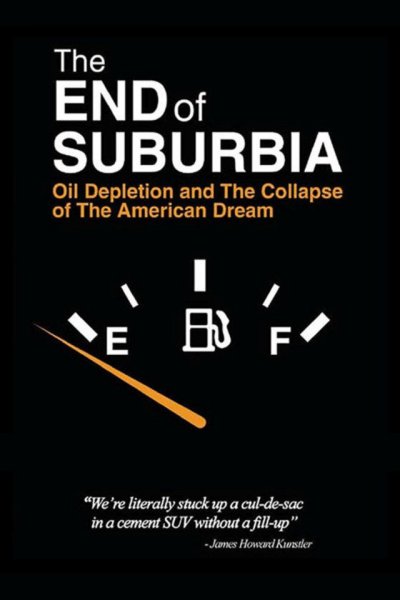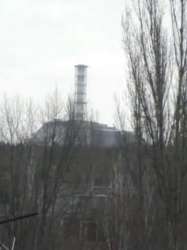The End of Suburbia: Oil Depletion and the Collapse of the American Dream is a canadien film of genre Documentary released in USA on 5 may 2004
The End of Suburbia: Oil Depletion and the Collapse of the American Dream (2004)

If you like this film, let us know!
Released in USA 5 may 2004
Length 1h18
OriginCanada
Genres Documentary
Themes Environmental films, Documentary films about environmental issues, Documentary films about technology, Documentary films about cities
Rating73%










The End of Suburbia: Oil Depletion and the Collapse of The American Dream is a 2004 documentary film concerning peak oil and its implications for the suburban lifestyle, written and directed by Toronto-based filmmaker Gregory Greene.
The film is hosted by Canadian broadcaster Barrie Zwicker and features discussions with James Howard Kunstler, Peter Calthorpe, Michael Klare, Richard Heinberg, Matthew Simmons, Michael Ruppert, Julian Darley, Colin Campbell, Kenneth S. Deffeyes, Ali Samsam Bakhtiari and Steve Andrews.
In 2007, Greene released a sequel called Escape from Suburbia.
Trailer of The End of Suburbia: Oil Depletion and the Collapse of the American Dream
Bluray, DVD
Streaming / VOD
Comments
Leave comment :
Suggestions of similar film to The End of Suburbia: Oil Depletion and the Collapse of the American Dream
There are 8963 with the same cinematographic genres, 1381 films with the same themes (including 1 films with the same 4 themes than The End of Suburbia: Oil Depletion and the Collapse of the American Dream), to have finally 70 suggestions of similar films.If you liked The End of Suburbia: Oil Depletion and the Collapse of the American Dream, you will probably like those similar films :
 , 1h35
, 1h35Genres Documentary
Themes Environmental films, Documentary films about environmental issues, Documentary films about technology, Documentary films about cities
Rating65%






3.11: Surviving Japan (2013)
, 1h30Directed by Simon Hilton
Genres Documentary
Themes Environmental films, Seafaring films, Transport films, Documentary films about environmental issues, Documentary films about historical events, Documentary films about nuclear technology, Documentary films about technology, Disaster films, Films about earthquakes
Rating81%





The film spans from March 11, 2001 to September 19, 2011, starting with Noland's own experience in the Tōhoku Earthquake and tsunami, Fukushima Daiichi nuclear disaster followed by volunteer activities in Ofunato

Hiroshima (2005)
, 1h29Origin United-kingdom
Genres Drama, Documentary
Themes Environmental films, Seafaring films, Transport films, Aviation films, Documentary films about environmental issues, Documentary films about war, Documentary films about historical events, Documentary films about nuclear technology, Documentary films about technology, Political films, Documentary films about World War II
Actors John Hurt, Ed Bishop, Katsumi Chō, Naoko Mori, Ian Shaw, Shane Rimmer
Rating76%





À 8h15 précises ce 6 août 1945, le monde a changé. 40.000 personnes trouvent instantanément la mort, mais ce sont bien 200.000 décès qui seront provoqués par l´explosion de la première bombe nucléaire sur Hiroshima, au Japon. Ce documentaire exceptionnel de 90 minutes n´est pas « Un énième film anti-guerre » déclare son réalisateur Paul Wilmshurst, « mais bien l´analyse neutre et objective d´une décision cruciale. Il ne s´agit pas d´être pro-américain ou pro-japonais, j´ai simplement voulu raconter la vérité. » Une vérité technologique, scientifique, militaire et politique qui se dessine dans les trois semaines précédant l´attaque, alors que le premier essai nucléaire vient de se dérouler dans le désert du Nouveau-Mexique, aux États-Unis. Le spectateur se retrouve alors dans la pièce où est prise la décision ultime, à bord de l´Enola Gay pendant son trajet fatidique, à l´intérieur de la bombe au moment de l´explosion, puis dans les rues dévastées d´Hiroshima.

The Unnamed Zone (2006)
, 1h20Directed by Carlos Rodríguez
Genres Documentary
Themes Environmental films, Documentary films about environmental issues, Documentary films about historical events, Documentary films about nuclear technology, Documentary films about technology, Disaster films
Rating63%





The Spanish film crew led by Carlos Rodriguez is following the life stories of three children - Lidia Pidvalna, Anastasia Pavlenko, and Andriy Kovalchuk - whose lives were drastically changed after an explosion at the Chernobyl Nuclear Power Station on April 26, 1986. Through the documentary, the children and their families "living perilously close to the exclusion zone around the destroyed station recount their fears, dreams, fantasies, and hopes for the future." Each child holds a "Chernobyl certificate" which bestows access to government grants and aid and is a gruesome reminder of their existential reality.

Nuclear Tipping Point (2010)
, 56minutesGenres Documentary
Themes Environmental films, Documentary films about environmental issues, Documentary films about war, Documentary films about historical events, Documentary films about nuclear technology, Documentary films about technology, Political films
Rating67%






The Day After Trinity (1981)
, 1h28Origin USA
Genres Documentary, Historical
Themes Environmental films, Documentary films about environmental issues, Documentary films about war, Documentary films about historical events, Documentary films about nuclear technology, Documentary films about technology
Actors Paul Frees
Rating77%





Ce film documentaire a été réalisé et produit par John Else en association avec la chaîne de télévision publique KTEH de San José (Californie). Le film raconte l'histoire de Robert Oppenheimer (1904–1967), le physicien qui joua un rôle prépondérant dans le développement de la première bombe atomique, testée en juillet 1945 au centre d'essai nucléaire de Trinity au Nouveau-Mexique.

White Horse (2008)
, 18minutesOrigin USA
Genres Documentary
Themes Environmental films, Documentary films about environmental issues, Documentary films about historical events, Documentary films about nuclear technology, Documentary films about technology, Disaster films
Rating69%





The beginning of the film starts with DeLeo, Bisson and Surkov driving through Kiev. This is introduced as the beginning of their journey to Pripyat, near the ground zero of Chernobyl. Once they reach the outpost outside the exclusion zone, we see that the area surrounding Pripyat is very deserted and dark. Once in the city, we see Surkov's old home, which he explains has been robbed of almost all its belongings due to looters. Yet there are still some mementos in the old apartment, including the wallpaper he and his mother put up, the training bars his father bought for him, an old rubber ball he claims was his favorite and a white horse poster plastered on the wall of his old bedroom. The pain he feels is evident. When he sees an old calendar on a door, he rips a large portion off, claiming "the year ended on April 26th". Outside the door of the apartment, he remarks how he wishes he could stay forever. He throws his old ball through the door and walks out of the apartment complex. The film ends with Surkov snapping some twigs in an old courtyard and then an image of the car they traveled in leaving the exclusion zone.

Voices of Transition (2012)
, 1h5Origin France
Genres Documentary
Themes Environmental films, La mondialisation, Films about the labor movement, Documentary films about business, Documentary films about environmental issues, Documentary films about technology, Documentaire sur le monde du travail, Disaster films
Rating75%





Using interviews and overlays of graphics and text, the film presents the current problems facing industrial agriculture. It explores why in the interviewees' view the current industrial model is not up to the task of feeding the world's people. According to the film every calorie of energy contained in a food source currently takes between 10 and 20 calories of crude oil in the production of fertilizers and transportation to produce, leading to a strong dependence of the cost of food on oil prices. As a result of peak oil and increasing oil prices this dependence will lead to ever increasing food prices. According to the film, this dependence already represents a significant weak-spot in the global food supply chain. Additionally, agriculture is already responsible for 40% of greenhouse gas emissions, contributing to climate change. Furthermore, the film argues that the overuse of inorganic fertilizers has been responsible for the loss of soil fertility and threatens the complete loss of usable soil within the next decades through soil erosion and sinking crop yields. These effects, according to the film, can only be partly mitigated by the increased use of those same fertilizers. The loss of workplaces, the concentration of land in the hands of a few (allegedly a farm closes every 23 minutes in France) as well as the dependence on large corporations are enumerated as side effects of the industrialisation of agriculture since the 1920s. Companies, such as Monsanto and Bayer, control everything from seed stock to fertilizers and the necessary chemical mixes for hybrid plants, thereby controlling the entire supply chain. The film argues that this development was supported through subsidies from the World Bank. Interviews with Vandana Shiva, the founder of the Transition Towns movement Rob Hopkins and various agricultural experts serve to argue this viewpoint. The dependence on crude oil is illustrated through the example of the wholesale food market in Rungis.

The Big Fix (2011)
, 1h30Directed by Rebecca Harrell Tickell, Josh Tickell
Origin USA
Genres Documentary
Themes Environmental films, Documentary films about environmental issues, Documentary films about technology
Actors Josh Tickell, Rebecca Harrell Tickell, Peter Fonda, Amy Smart
Rating76%





 Connection
Connection
